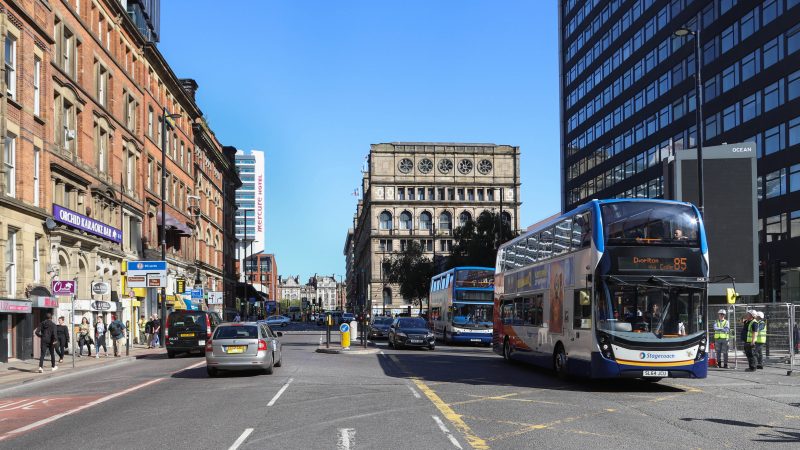
It’s been over three years in the making but yesterday saw Andy Burnham confirm that Greater Manchester will be the first English region to bring its buses under public control, an important step in reversing decades of mismanagement by private companies. While operators like Stagecoach are set to challenge the decision, many think the move will hold.
Labour should make much of Burnham’s success. The vast majority of people agree that local authorities should be in charge of their buses, and the announcement offers an opportunity to restore our relationship with the party’s alienated former strongholds.
Labour Together’s report into the 2019 election defeat suggested the third biggest reason we lost previous voters was that they felt “the Labour Party no longer seems to represent people like me”. With the current Tory government talking the talk on issues of regional inequality and green industrial jobs, Labour has been struggling to articulate a clear, positive vision for its lost voters.
Andy Burnham has led the way in Labour’s attempts to re-establish itself as the party of the Northern people. Most notably, he played the part of “King in the North” against a central government refusing to support England’s regional economies under tiered Covid restrictions. The Labour Party should learn the lessons from Burnham’s success, particularly appreciating the importance of his “energetic [and] genuinely populist” leadership.
As a significantly devolved issue, buses are an obvious place to apply this while the party remains in opposition. Deregulation, where private operators set their own fares, routes, and standards, has seen bus use plummet in England’s regions as a result of inflation-busting hikes and cuts to local services. All this while, companies have leeched off local people, paying out an average £277m a year in dividends – a huge loss to regional economies.
If the Labour Party is to win back former voters, it needs to show that, where it is in power, it is willing to stand up against the interests of Big Business to benefit local people. Only public control, or better still public ownership, can ensure the needs of our communities are met, as current municipal bus companies show. The party also needs to expose the flaws in the government’s levelling-up and environmental rhetoric, something the fight over deregulation can do.
Current government policy pushes local authorities to retain our failing system of deregulation, with a thin veneer of coordination, using so-called “enhanced partnerships”. These deals require voluntary concessions from bus companies in return for infrastructure funding from local authorities. As work by the Centre for Cities shows, they are a pale imitation of the radical reform our buses desperately need (and that public control offers).
Given that London has been allowed to prosper under a regulated system for the last 35 years (seeing passenger journeys double), while our regions have suffered under deregulation (journeys have more than halved), enhanced partnerships fall far short of levelling up the nation’s bus network.
As the Association of British Commuters explains, the legislation that backs up enhanced partnerships generates a “huge imbalance of power between local government and private bus operators, resulting in just one enhanced partnership in the last four years”.
What’s more, under current rules, only mayoral authorities have the power to begin the franchising process independently. Other local governments must apply to the secretary of state for transport to access these powers. This act of gatekeeping serves as another opportunity to stand up for former Labour voters, laying bare the empty rhetoric of ‘levelling up’ as the government has created a two-tier system of devolution.
Rather than being put off by this, Labour should take on the challenge in non-mayoral authorities. If the party is to learn lessons from Burnham’s leadership, taking on the government to win a world-class bus network for every community should be a top priority.
There is still no ring-fenced funding for bus transport within local authorities, meaning any public support for quieter but essential bus routes must compete with other local needs. This reinforces the wider regional inequalities in transport funding, including the imbalance that saw areas like Yorkshire and the Humber set to receive just £844 per head in transport investment to London’s £4,155.
Despite the uphill struggle, bus re-regulation should be easier for the next Labour authority. Not only has the process now been successfully completed, but Greater Manchester will have built up expertise in how to complete the process – something it should share with other regions. The government has also opened the door to further attempts to win public control, by allocating £25m to support local authorities evaluate their bus networks – funding that can be used to make bus re-regulation a key part of Labour’s local agenda.
The party’s hopeful for the inaugural West Yorkshire mayoralty, Tracy Brabin, seems to appreciate this opportunity. Not only does she intend to emulate Burnham’s style of leadership but she has also committed to bring buses under public control.
When local Labour governments take on the combined interests of Big Business and Conservative devolution bluster, they start to show what Labour in power is all about: ensuring the country works in the interests of ordinary people. Choosing to run regional bus networks as a green public service, rather than for private profit, would do just that.




More from LabourList
‘It’s one year since I became Britain’s youngest MP. Here’s what I’ve achieved so far’
Tribute: ‘David Lipsey’s joie de vivre is missing in Labour politics today’
Ellie Reeves: ‘One year in, the next phase begins – focused on living standards’